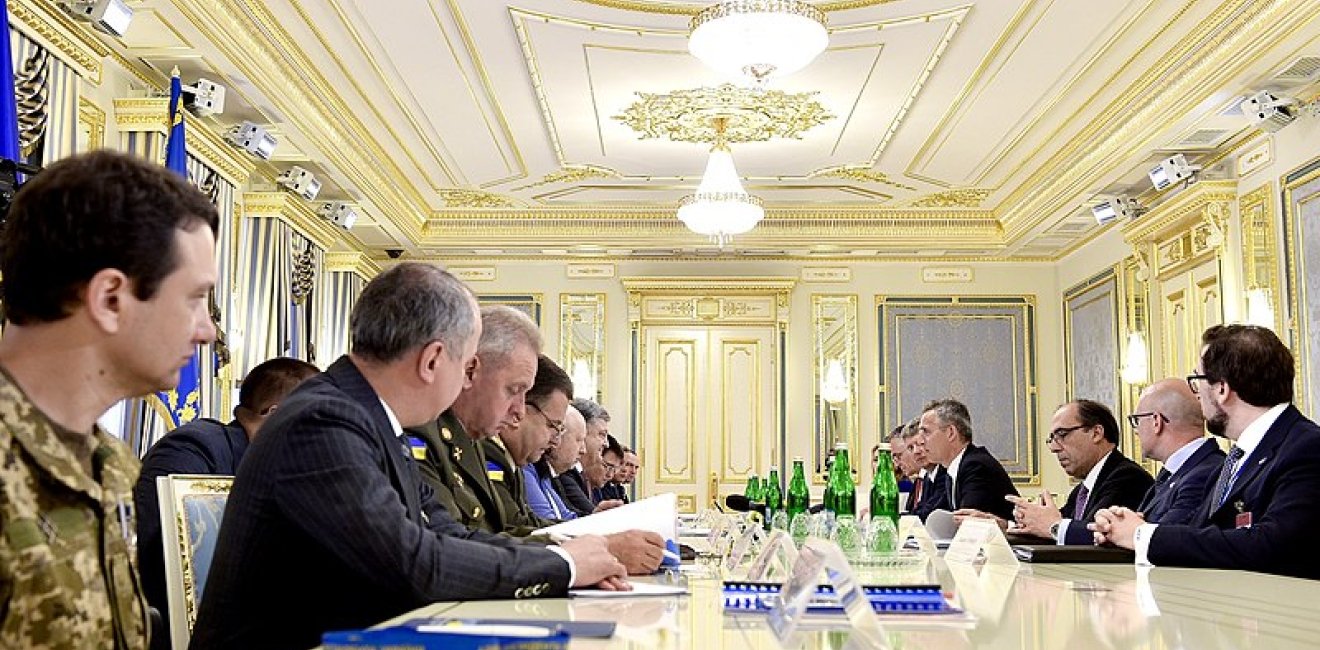
A blog of the Kennan Institute
BY ARTEM GERGUN
The term “Finlandization” is making a comeback as a way to describe how Ukraine, delicately poised between East and West, might handle international relations. The term refers to the limitations of Finland's foreign policy during the Cold War and is generally considered pejorative. It has received increasing attention as Russian president Vladimir Putin has made plain that Kyiv’s membership in NATO is incompatible with his regime’s conception of Russian security interests.
Russian military intervention into Crimea and Donbas prompted a number of U.S. high-profile experts, including Henry Kissinger, Zbigniew Brzezinski, and Stephen Walt, and influential Ukrainian power brokers such as Viktor Medvedchuk and Viktor Pinchuk to endorse the idea of “Finlandizing Ukraine”: the country would be free to “associate” itself with Europe; however, it would have to refrain from NATO membership for the sake of keeping strong economic ties with Russia. The rationale underlying this proposal is simple: Ukraine as a small country living alongside a large and aggressive neighbor should accept a reduction of its sovereignty, particularly in the realm of foreign policy, and should maintain independence from, but good relations with, both Moscow and the West.
However, the logic of realism, when pressed, yields only more questions. Will the promise of Ukrainian neutrality be enough to end the conflict in Donbas, as well as improve relations between Russia and the West? Will Russia treat Ukraine with dignity should Kyiv fulfill the Minsk agreements in the way Moscow has envisioned? To what degree do or should Kyiv-Moscow relations be contingent on developments in the broader East-West divide in foreign affairs?
On the one hand, liberal international relations theorists rightly admit that a prosperous and democratic Ukraine poses a constant threat to Vladimir Putin's autocratic government. Ukraine is more than a security issue to Russia; it's a direct threat to Putin's political regime. The idea of an economically comfortable, democratic society contrasts with the largely conservative society of Putin's Russia. On the other hand, the realists are right about Western nations’ concerns over what could happen in the broader geopolitical space if Ukraine joined both NATO and EU. In the near term, then, it is impossible for Ukraine to become a full-fledged member of NATO and the EU for a wide range of internal and external reasons.
The realist and the liberal approaches to the question of Ukraine’s geopolitical future seem irreconcilable. Yet this view—that no consilience is possible—obtains only from an external perspective, and only as long as both realist and liberal projects explain Ukraine according to certain templates of political behavior. The realists tend to underestimate the internal societal dynamics. They depict Ukraine’s geopolitic ambiguity as a consequence of its historical and cultural divide between the country’s pro-Russian East and pro-European West, accepting without question that Ukraine has become something of a territory for the encounter of rival geopolitical forces. Liberals, on the other hand, tend to disregard the role of power politics in the international arena. Explaining the reluctance of key EU member countries (for example, Germany or France) to give Ukraine the green light for joining the EU and NATO, they substitute, though unintentionally, realpolitik reasons for benevolent diagnoses such as “lack of anti-corruption effort” or “sluggish pace of reforms.”
Consequently, both realists and liberals tend to deny the geopolitical subjectivity of Ukraine. As a rule, the former consider Ukraine a victim of its own history and geographic location, the latter regard Ukraine as a lieutenant to the West in the West’s stand-off with Russia. Ironically, this vision of Ukraine’s minor role in the international arena influences its geopolitical self-esteem at home, hindering its self-identification, initiative, and freedom of action. The result is a kind of blanket approach to “the West” that does not recognize any major foreign policy differences toward Ukraine either within EU member states or between the EU and the United States.
Still, there is a room for Ukraine’s ability to be a master of its own destiny. Better awareness of the topography of national interests across the Atlantic will help Ukraine develop a stronger voice in its dealings with Russia. References to “Western support,” so popular among Ukrainian political elite, cannot be used to excuse geopolitical weakness. It is becoming obvious that Ukrainian elites tend to shift the responsibility from Kyiv to Brussels or Washington in such key domains of governance as security, welfare, and trade policy. A typical scheme for the European integration of Ukraine, which is on the minds of many Ukrainian officials, goes as follows: We need NATO to protect our borders from Russia, the United States for financial and political support, and the EU to provide resources for infrastructure and development. Thus the aim of Ukrainian foreign policy is “to demand” (a “full-fledged membership”) but not “to give.”
I believe there is a third way between the harsh truths of the realists and the futile optimism of the liberals. Ukraine should steer this course to avoid the risks of Finlandization. Its sovereignty requires that Ukraine be proactive about its future rather than simply try to adapt to the shocks and turns in the tumultuous and constantly evolving Russia-U.S.-EU relationship. Ukraine’s belonging to the West should not depend merely on Western support. Instead, it should depend on the country’s real merit in terms of what it can contribute to European economic prosperity and security.
Author

Advisor to Chairman of the Economic Affairs Committee MP Dmytro Natalukha, Verkhovna Rada, the Parliament of Ukraine

Kennan Institute
After more than 50 years as a vital part of the Wilson Center legacy, the Kennan Institute has become an independent think tank. You can find the current website for the Kennan Institute at kennaninstitute.org. Please look for future announcements about partnership activities between the Wilson Center and the Kennan Institute at Wilson Center Press Room. The Kennan Institute is the premier US center for advanced research on Eurasia and the oldest and largest regional program at the Woodrow Wilson International Center for Scholars. The Kennan Institute is committed to improving American understanding of Russia, Ukraine, Central Asia, the South Caucasus, and the surrounding region through research and exchange. Read more

Explore More in Focus Ukraine
Browse Focus Ukraine
Talking to the Dead to Heal the Living

Ukrainian Issue in Polish Elections


